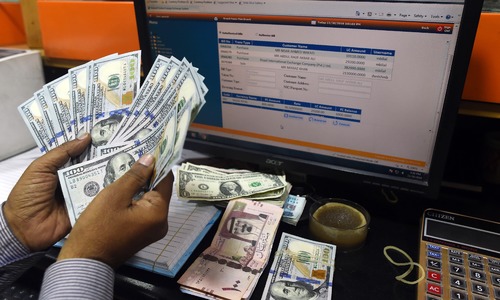Govt wants SBP to consult Centre on exchange rate

ISLAMABAD: Exactly a week after the currency devaluation and interest rate hike that tumbled markets and stirred a political debate, the government on Friday asked the State Bank of Pakistan (SBP) to work out a mechanism of consultations with the Centre on the exchange rate.
The issue came under discussion at a meeting of the Monetary and Fiscal Policies Coordination Board (MFPCB) presided over by Finance Minister Asad Umar. According to sources, the minister expressed reservations over the timing of the recent monetary policy and told SBP Governor Tariq Bajwa that the government fully supported the central bank’s independent role but it should be taken on board on such issues.
The MFPCB had last met on Nov 29 and expressed concern over the growing budget deficit and inflation, increasing government borrowing from the SBP and sluggish revenue performance. The following day, the SBP had increased its policy rate by 150 basis points to 10pc and the rupee lost almost 3.8 per cent value against the dollar.
Finance Minister Asad Umar expresses reservations over the timing of central bank’s recent monetary policy
A member of the board told Dawn that the finance minister also desired a long-term strategy on exchange rate roadmap and argued that the improvement on the export side did not originate from the currency devaluation but smooth energy supplies. This was evident from positive signs appearing on the export front before currency adjustments in December.
The member said the SBP governor stood his ground on the autonomous role of the Monetary Policy Committee (MPC) of the central bank and believed the exchange rate adjustment was a globally-accepted tool. He said the political furore was caused by the timing of the exchange rate adjustment last week because it coincided with the completion of the first 100 days of the Pakistan Tehreek-i-Insaf government in power.
Under the existing legal arrangement, the MPC comprised 10 members, but the finance secretary was no more a member and used to be seen as a source of federal government influence on independence of the State Bank.
The sources said Dr Asad Zaman, vice chancellor of the Pakistan Institute of Development Economics (PIDE), also supported the SBP governor’s stance and argued that irrespective of short-term signs from here and there, there was no argument on the fact that long-term export performance had to come from exchange rate movement. Therefore, he said, there should be no pressure on the central bank on such matters.
Generally, the MFPCB was of the view that recent changes in the monetary policy stance were appropriate at current levels given the projections for inflation in the fiscal year 2019-20. The real interest rates were significantly positive and would help manage aggregate demand and reduce output gap closer to sustainable levels.
Going forward, the board expects that the MPC would continue to make data-driven decisions based on macroeconomic fundamentals. It appreciated the government’s proposed adjustment plan to bring the current account to its norms soon while adjusting fiscal deficit gradually to a sustainable level.
The government explained that they were focused on a growth model based on export promotion, productivity gains and structured institutional governance. The MFPCB advised the authorities to be more forthcoming with the stakeholders to explain the homegrown adjustment plan which seemed to be effectively working for the stabilisation of the economy.
The sources said the SBP reiterated its concern over the government’s heavy reliance on central bank borrowing, but noted that the situation might continue for another couple of months until some foreign inflows materialised.
On the exchange rate front, the MFPCB discussed the recent volatility in the rupee parity and was of the view that the present developments were mainly explained by market’s demand-supply gap of dollar liquidity on the one hand and more underlying structural impediments on the other.
In principal, the parity should be at their competitive-enhancing levels. Accordingly, after the latest adjustments, it is now more reflective of economy’s medium-term needs and market conditions. The MFPCB “anticipated that the short-term conditions on the exchange rate front were likely to normalise. Particularly, availability of deferred oil facilities and the recent decline in international oil prices is expected to reduce pressures in the Pakistan foreign exchange market in the near-term”, a statement said.
Moreover, bilateral flows would close the financing gap for FY19 and these positive developments would build foreign exchange reserves in the coming months, the board hoped.
The impact of fiscal consolidation measures implemented in recent months would be visible from the second quarter of the current financial year. “The consolidation is an important element of the homegrown adjustment plan and will play an integral part in ensuring economic stability,” the statement said.
Published in Dawn, December 8th, 2018













































